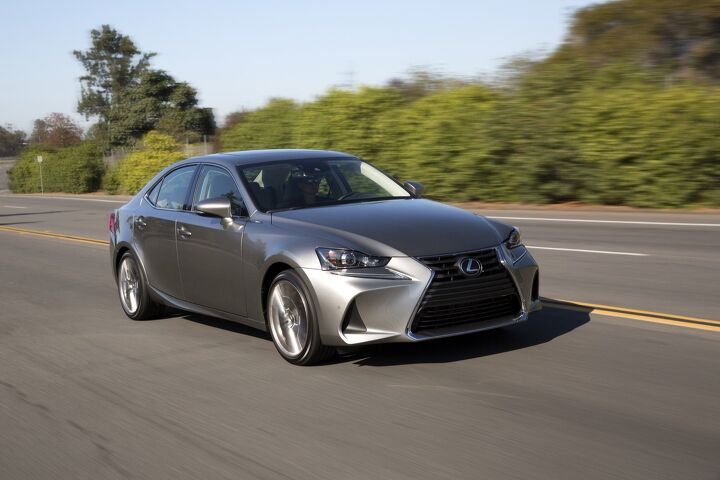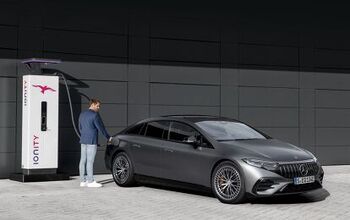For 2018, Lexus IS and RC Model Naming Scheme Is All Kinds of Warped
First things first: Lexus is hardly the only automaker deserving of blame for unintelligibly altering model nomenclature. Moreover, Lexus continues to offer some models for which the badge makes sense. A Lexus LX570, for example, is an LX with a 5.7-liter V8. The Lexus IS350 we tested earlier this month utilizes a 3.5-liter V6.
How sensible. How obvious. How traditional.
But for 2018, the Lexus IS and its RC stablemate will muddy the displacement waters that were already complicated in 2017 by a detuned 3.5-liter V6 that wore IS300 and RC300 badging. In 2018, while the mid-range car continues to make its power from a 260-horsepower 3.5-liter V6 (not the upgraded 311-horsepower 3.5-liter V6 of the IS350 and RC350), the 2.0-liter turbocharged mill that was previously under the hood of the IS200t and RC200t is now the engine under the hood of the rear-wheel-drive IS300 and RC300.
Confused? Yeah, we are, too. Let’s try that again.
Take it from the top.
The 2018 Lexus IS350, both with rear or all-wheel drive, continues with the same 3.5-liter V6 from before, only now with five additional horsepower (for 311 in total).
Down a rung on the ladder you’ll find the 2018 Lexus IS300 AWD. A 260-horsepower version of the 2GR-FKS 3.5-liter V6 is linked to a six-speed automatic.
At the base of the range there’s now a rear-wheel-drive 2018 Lexus IS300. But rather than the 3.0-liter V6 you might expect to find in a model badged as such, and rather than the detuned 3.5-liter V6 of the 2018 IS300 AWD, the rear-wheel-drive 2018 Lexus IS300 is equipped with a 2.0-liter turbocharged four-cylinder producing 241 horsepower and 258 lb-ft of torque, 22 more lb-ft than the IS300 AWD’s 3.5-liter V6.
Carry the same numbers into the RC range and you have it all figured out.
Simple? Straightforward? Transparent? Hardly.
But strategic? Most definitely. Lexus will now badge its entry-level sedan and coupe to appear as though they’re not entry-level cars.
Since Toyota’s upmarket brand was making some designation changes, the larger GS lineup benefited from similar alterations. The GS200t becomes the GS300, albeit still with the same 2.0T. The IS and RC mid-range 3.5-liter V6 does not make an appearance in the GS.
[Images: Toyota Motor Corp.]
Timothy Cain is a contributing analyst at The Truth About Cars and Autofocus.ca and the founder and former editor of GoodCarBadCar.net. Follow on Twitter @timcaincars and Instagram.
More by Timothy Cain
Latest Car Reviews
Read moreLatest Product Reviews
Read moreRecent Comments
- Kjhkjlhkjhkljh kljhjkhjklhkjh *Why would anyone buy this* when the 2025 RamCharger is right around the corner, *faster* with vastly *better mpg* and stupid amounts of torque using a proven engine layout and motivation drive in use since 1920.
- Kjhkjlhkjhkljh kljhjkhjklhkjh I hate this soooooooo much. but the 2025 RAMCHARGER is the CORRECT bridge for people to go electric. I hate dodge (thanks for making me buy 2 replacement 46RH's) .. but the ramcharger's electric drive layout is *vastly* superior to a full electric car in dense populous areas where charging is difficult and where moron luddite science hating trumpers sabotage charges or block them.If Toyota had a tundra in the same config i'd plop 75k cash down today and burn my pos chevy in the dealer parking lot
- Kjhkjlhkjhkljh kljhjkhjklhkjh I own my house 100% paid for at age 52. the answer is still NO.-28k (realistically) would take 8 years to offset my gas truck even with its constant repair bills (thanks chevy)-Still takes too long to charge UNTIL solidsate batteries are a thing and 80% in 15 minutes becomes a reality (for ME anyways, i get others are willing to wait)For the rest of the market, especially people in dense cityscape, apartments dens rentals it just isnt feasible yet IMO.
- ToolGuy I do like the fuel economy of a 6-cylinder engine. 😉
- Carson D I'd go with the RAV4. It will last forever, and someone will pay you for it if you ever lose your survival instincts.



































Comments
Join the conversation
I've noticed this number discrepancy when I bought my wife a used Lexus Rx400h. It does not have a 4.0L V8 engine as one would guess from the numbering system, but instead has a detuned 3.3L V6 with an electric hybrid motor that when in conjunction mimics the power output of a 4.0L V8. It even makes a angry growl when you get on the throttle. So it appears that Toyota went with a numbering system of comparable power and perhaps their marketing department thought the consumer was not knowledgable enough to know what a 2.0T or 3.3L gas-electric motor would put out. To be fair, a stock 2.0T could range from 145hp - 260hp.
Not as warped as that front-end bodywork.